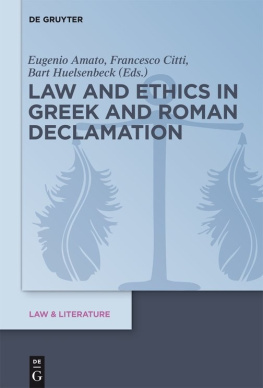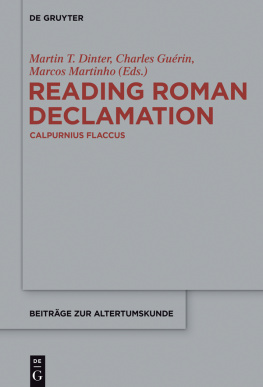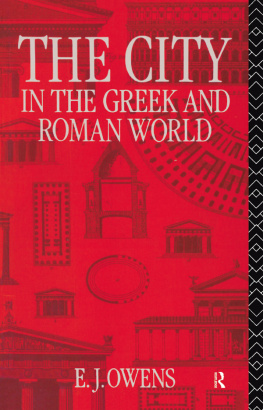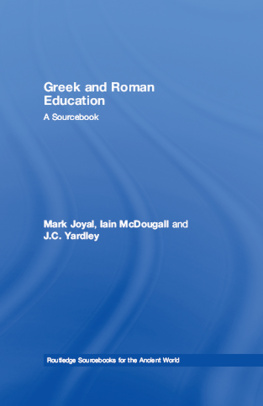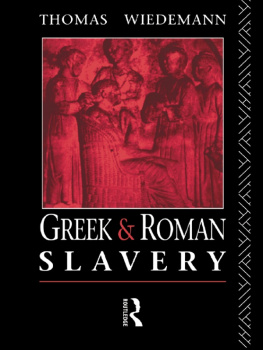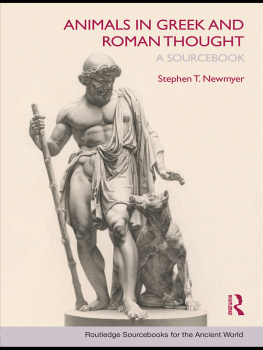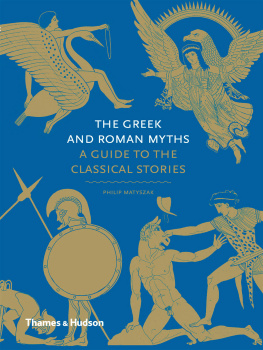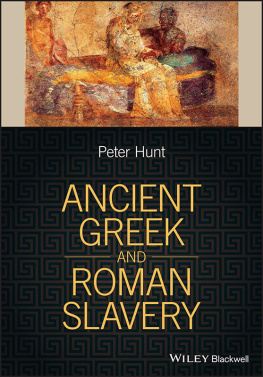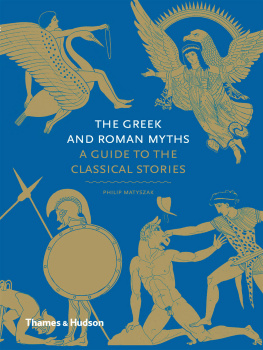Amato Eugenio - Law and Ethics in Greek and Roman Declamation
Here you can read online Amato Eugenio - Law and Ethics in Greek and Roman Declamation full text of the book (entire story) in english for free. Download pdf and epub, get meaning, cover and reviews about this ebook. City: Berlin;München, year: 2015, publisher: De Gruyter, genre: Romance novel. Description of the work, (preface) as well as reviews are available. Best literature library LitArk.com created for fans of good reading and offers a wide selection of genres:
Romance novel
Science fiction
Adventure
Detective
Science
History
Home and family
Prose
Art
Politics
Computer
Non-fiction
Religion
Business
Children
Humor
Choose a favorite category and find really read worthwhile books. Enjoy immersion in the world of imagination, feel the emotions of the characters or learn something new for yourself, make an fascinating discovery.
- Book:Law and Ethics in Greek and Roman Declamation
- Author:
- Publisher:De Gruyter
- Genre:
- Year:2015
- City:Berlin;München
- Rating:5 / 5
- Favourites:Add to favourites
- Your mark:
- 100
- 1
- 2
- 3
- 4
- 5
Law and Ethics in Greek and Roman Declamation: summary, description and annotation
We offer to read an annotation, description, summary or preface (depends on what the author of the book "Law and Ethics in Greek and Roman Declamation" wrote himself). If you haven't found the necessary information about the book — write in the comments, we will try to find it.
Law and Ethics in Greek and Roman Declamation — read online for free the complete book (whole text) full work
Below is the text of the book, divided by pages. System saving the place of the last page read, allows you to conveniently read the book "Law and Ethics in Greek and Roman Declamation" online for free, without having to search again every time where you left off. Put a bookmark, and you can go to the page where you finished reading at any time.
Font size:
Interval:
Bookmark:
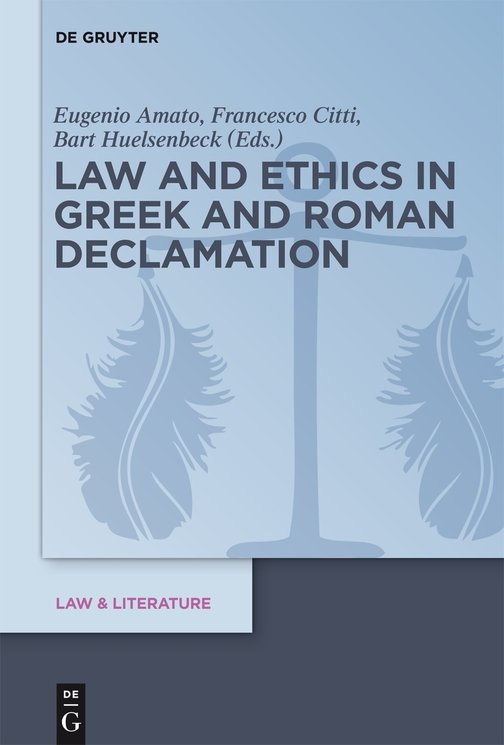
Eugenio Amato is Professor of Greek at the University of Nantes, France, and Member of the Institut Universitaire de France; Senior Editor of the Revue des tudes tardo-antiques ; President of the International Association Textes pour lHistoire de lAntiquit Tardive; and Director of the research center LAntique, le Moderne (University of Nantes). He has published widely in the field of rhetoric, including most recently: Favorinos dArles. Oeuvres , vols. I and III (2005, 2010); Severus sophista Alexandrinus. Progymnasmata (2009); I Progimnasmi di Severo di Alessandria (Severo di Antiochia?) (2009); Xenophontis imitator fidelissi-mus. Studi su tradizione e fortuna erudite di Dione Crisostomo tra XVI e XIX secolo (2011); Procope de Gaza. Discours et fragments (2014); Traiani Praeceptor. Studi su biografia, cronologia e fortuna di Dione Crisostomo (2014). He is currently leading a research team at work on an edition, with translation and commentary, of the works of Choricius of Gaza.
Emanuele Berti is Researcher of Latin Literature at the Scuola Normale Superiore in Pisa, Italy. He is particularly interested in Latin literary culture, rhetoric, and poetry of the early imperial age (Seneca the Elder and declamation, Seneca the philosopher, Lucan, Tacitus). Among his most important publications are M. Annaei Lucani Bellum civile, liber X (2000); Scholasticorum studia. Seneca il Vecchio e la cultura letteraria e retorica della prima et imperiale (2007); and Tacito, Dialogo sulloratoria (2009).
B Breij is Associate Professor at Radboud University Nijmegen, the Netherlands. She is interested in rhetorical texts for studying the social and cultural problems of the Roman Empire. Publications include: Pseudo-Quintilians Major Declamations 18 and 19: Two controversiae figuratae in Rhetorica (2006); Vitae Necisque Potestas in Roman Declamation in Advances in the History of Rhetoric (2006); and Dilemmas of Pietas in Roman Declamation in Sacred Words: Orality, Literacy and Religion (edited by A. Lardinois, J. Blok, and M. van der Poel, 2011). She also has a forthcoming book: [Quintilian]: The Son Suspected of Incest with His Mother ( Major Declamations , 1819).
Graziana Brescia is Associate Professor of Latin Language and Literature at the University of Foggia, Italy. Her research ranges between historiography, lexicography, rhetoric, Roman elegy, anthropology of the ancient world, and classical reception. She has a particular interest in Latin declamation, having published several monographs related to this topic: Il Miles alla sbarra . [Quintiliano] Declamazioni maggiori, 3 (2004); La sfida impossibile . Ps. Quint. Declamazioni minori 317: introduzione, traduzione e commento (2006); and, with M. Lentano, Le ragioni del sangue: storie di incesto e fratricidio nella declamazione latina (2009). Among more recent publications is Anna soror e le altre: coppie di sorelle nella letteratura latina (2012).
Francesco Citti is Professor of Latin at the University of Bologna, Italy. His principal interests are Latin philosophical literature (esp. Horace and Seneca), rhetoric and Latin declamation, as well as reception of the classics in modern and contemporary literature. Publications on these topics include: Orazio. Linvito a Torquato. Epist. 1,5 (1994); Studi oraziani: tematica e intertestualit (2000); with C. Neri, Seneca nel Novecento: sondaggi sulla fortuna di un classico (2001); and Cura sui: studi sul lessico filosofico di Seneca (2012).
Bart Huelsenbeck is Assistant Professor of Classics at Ball State University, USA, where he teaches a broad range of language, literature, and culture courses. His research concentrates on Roman literature, particularly rhetoric and historiography, and the transmission and reception of classical texts. Studies published in these fields include: The Rhetorical Collection of the Elder Seneca: Textual Tradition and Traditional Text in Harvard Studies in Classical Philology (2011); Seneca Contr . 2.2.8 and 2.2.1: the Rhetor Arellius Fuscus and Latin Literary History in Materiali e discussioni (2011); A Nexus of Manuscripts Copied at Corbie, c. 850880: Copying Procedure and a Typology of Script-style in Segno e testo (2013). He is currently revising his dissertation, Figures in the Shadows (2009), a study of the elder Senecas collection and its quotations of declaimers.
Mikael Johansson is Researcher of Greek at the University of Gothenburg, Sweden. He teaches Greek, Latin, and rhetoric. His research fields are late antique rhetoric (Libanius, Hermogenes, and others) and historiography. His doctoral thesis, Libanius Declamations 9 and 10 (2006), focuses on the fourth-century sophist Libanius use of historical motives. It also examines the importance of the rhetorical handbooks of Hermogenes in some of Libanius declamations. He is currently working on Libanius Declamations 1723.
Mario Lentano is Researcher of Latin Literature and a member of the Center for Anthropology of the Ancient World at Siena University, Italy. His chief research interest is the anthropology of Roman culture. Recent publications include: La memoria e il potere: censura intellettuale e roghi di libri nella Roma antica (2012); and, with M. Bettini, Il mito di Enea: immagini e racconti dalla Grecia a oggi (2013).
Simona Lupi studied at the University of Freiburg, Germany, and was awarded a postdoctoral research fellowship at the University of Sassari, Italy, where she taught Greek language and literature. Her research focuses on late antique rhetoric, particularly the school of Gaza. She is the author of Coricio di Gaza, XVII (= Decl. 4) F.-R.: Milziade. Introduzione, traduzione e commento (2010). Her articles include: Uso del passato nella declamazione 4 di Coricio di Gaza, Milziade (XVII = decl. 4 F.-R.) in Klio (2009); Il Milziade di Coricio di Gaza (or. 17): rappresentazione retorica di una vicenda storica in Eikasmos (2010); and Il mito di Afrodite ed Adone alla scuola di retorica di Gaza in Revue des tudes anciennes (2012).
Lucia Pasetti is Associate Professor of Latin at the University of Bologna, Italy. Her main research interests are Roman comedy and the novel, classical reception, and declamation. She has published several volumes on these topics, including: Plauto in Apuleio (2007); Anfitrione. Plauto, Molire, Kleist, Giroudoux (2007); and [Quintiliano], Il veleno versato. Declamazioni maggiori, 17 (2011). She is currently leading a research team at work on an edition, with translation and commentary, of the Quintilianic Minor Declamations .
Alberto J. Quiroga Puertas is Ramn y Cajal Fellow in the Department of Ancient Greek at the University of Granada, Spain. His main research interests include late antique literature and Christian rhetoric. The impact of rhetoric on the creation of cultural and religious identities in late antiquity is the subject of a volume that he recently edited, The Purpose of Rhetoric in Late Antiquity: From Performance to Exegesis (2013).
Pablo Schwartz is Assistant Professor of Latin Language and Literature at the University of So Paulo, Brazil, and he is currently Secretary of the Brazilian Society of Rhetoric. He works on Roman rhetoric and post-classical Latin literature, especially declamation and its interrelationship with other genres. Among recently published studies are: Retrica, literatura y poltica a partir del Dialogus de oratoribus de Tcito in Lecturas Retricas de la Sociedad (edited by H. Beristin, 2002); Polmicas retricas y poticas en Sneca el Viejo in Voces rele-gadas del mundo Greco-Latino (edited by A. Castillo and R. Peveroni, 2009); and Consideraes sobre os prefcios de Sneca o Retor in Ensaios de Retrica Antiga (edited by T. R. Assuno, O. Flores-Junior, and M. Martinho, 2010).
Font size:
Interval:
Bookmark:
Similar books «Law and Ethics in Greek and Roman Declamation»
Look at similar books to Law and Ethics in Greek and Roman Declamation. We have selected literature similar in name and meaning in the hope of providing readers with more options to find new, interesting, not yet read works.
Discussion, reviews of the book Law and Ethics in Greek and Roman Declamation and just readers' own opinions. Leave your comments, write what you think about the work, its meaning or the main characters. Specify what exactly you liked and what you didn't like, and why you think so.

